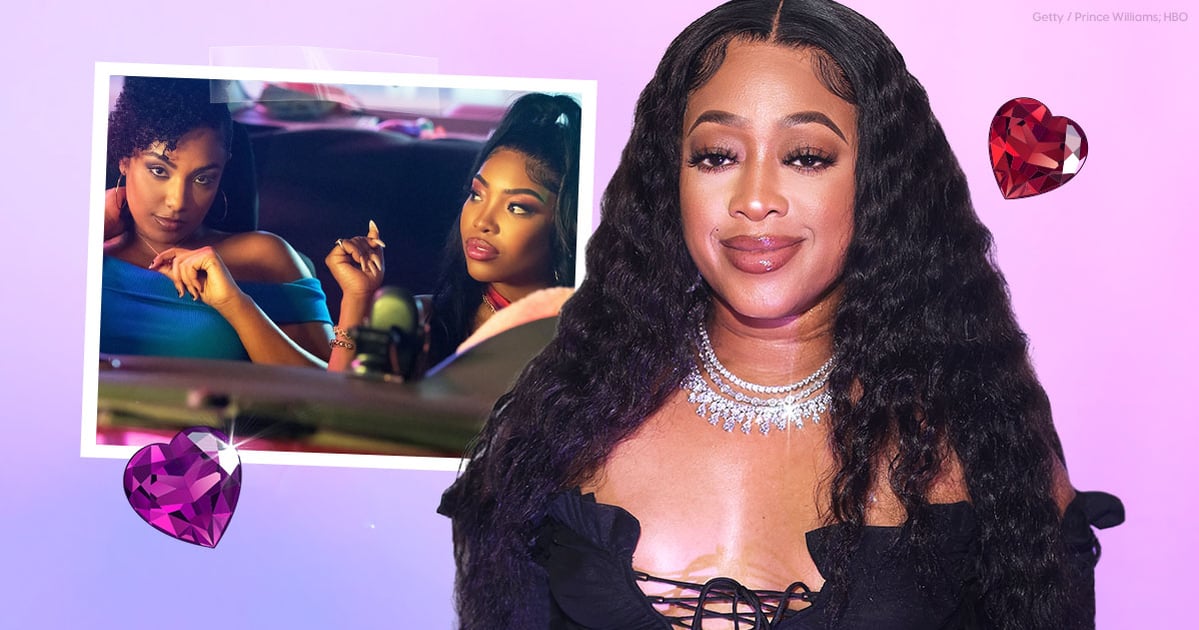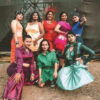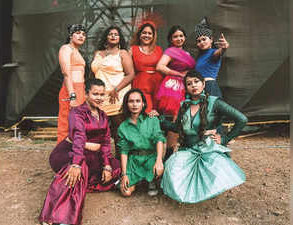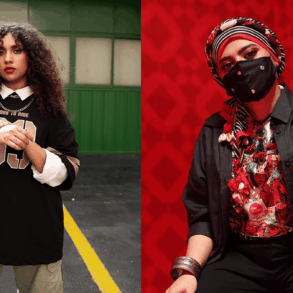
On the last night of Rolling Loud Miami, a coalition of hip-hop’s latest and greatest female rappers paid homage to the Queen. Not Queen Bey. Or Lil’ Kim. But Trina. When the DJ dropped “Look Back at Me,” a classic song from “Still Da Baddest,” all of today’s hip-hop queens were feeling it: Latto, TiaCorine, FloMilli, KaMillion, Kari Faux, Maiya the Don.
For those born and raised in the Southern United States, Trina was among the first wave of rappers to represent not only for the South but for women overall, and her impact is felt everywhere — from the rap game to modern television. Three years after André 3000 and Big Boi of Outkast said “The South got something to say” at the 1995 Source Awards, a swift and fierce rebuke of the bicoastal elites who thought the South should have no say in hip-hop, Trina made her debut on “Nann N***a,” the first single from Trick Daddy’s sophomore album. With that, she changed history.
At the time of the song’s release, Trina was not old enough to drink, but was wise enough to articulate the gendered power dynamics of being a young Black woman in Miami. While the male rappers from the city were encouraged to share and celebrate their sexual voyeurism, the cultural and popular impact of 2 Live Crew would be nothing without the women featured in their videos.
“Rap Sh!t” . . . took Rae’s homage to hip-hop to the next level.
Trina was the first to vocalize what every woman featured in the city’s hip hop and nightlife scene had been feeling. Without the contributions of countless, unnamed women who have elevated the success of men, they would be nothing. Unbeknownst to Trina, her verse was a resounding shot that rippled through the clubs of Miami and the South to encourage women to take their rightful place and clap back at any man that told them otherwise.
Her words were not only the dismissal of the gendered double standard, but her appearance in the song’s music video revolutionized the Southern woman. The oh-so-sweet Southern girl concept, heralded by Maze and Frankie Beverly, was gone. Trina was not a Georgia Peach or Southern sweetheart. She was the embodiment of the girls who grew up around country hustlers, meaning her delivery had a sugar-coated bite to it. She was equal parts country and hard, and her clothes reflected a niche cultural aesthetic, often referred to as country, backwards, or “hoochie” by those on the East and West coast, but she embraced it all. Because girls down South weren’t dressing like Lil’ Kim or Yo-Yo, they were dressing like Trina.
In recent years, mainstream audiences have been reintroduced to the queen not only through hip-hop, but also through TV shows — and that’s in large part thanks to Issa Rae.
Like many of her generation, Rae grew up with a love of hip-hop and willingness to broadcast her unique, original ideas online and on social media for the world to see. Like a hungry rapper trying to make a name for themselves by uploading freestyles from their car, Rae was sharing videos from her college dorm room in hopes that they’d be stepping stones to a fruitful career. Of course, she ended up creating and starring in HBO’s “Insecure,” a critically acclaimed series that featured hip-hop greats. But it’s “Rap Sh!t” that took Rae’s homage to hip-hop to the next level.
The origin story of “Rap Sh!t” goes like this: towards the end of “Insecure,” as Rae was in the midst of brainstorming her next series, a male producer reportedly made a comment about the current state of female rap. His comment, a series of words tethered together by misogynoir and whorephobia, proclaimed that female rappers only rap about their pussy — a double standard that has existed in hip-hop since the first female rapper spoke about an orgasm. Although his comment, like many before, has always aimed at the bodily autonomy and agency of women in rap, this felt different.
His comment exists in a world where women in rap can talk about their pussy and reach the highest of music charts and receive a Grammy for being a “savage.” Although women in rap have been talking about their pussy for decades (Mia X, Gangsta Boo, Khia, Jackie O), now women rappers have social media as a creative outlet, where there is no male or record label interference, just pure unadulterated, X-rated lyricism.
This is where “Rap Sh!t” resides. The series, which debuted in the summer of 2022 and whose second season is set to drop on Nov. 9, incorporates the meteoric rise of Cardi B, Megan Thee Stallion, Noname, and City Girls, who serve as executive producers. The show follows Shawna (played by Aida Osman) and Mia (played by KaMillion) as two estranged friends who reunite and, after a girls’ night out, form a rap group. The deciding factor, an overwhelming positive reception to “Seduce & Sheme,” their drunken freestyle over “K-Wang” — a Khia classic with an accompanying line dance played at baby showers, night clubs, and funerals — is the first indication of the show’s Southern roots.
Although “Rap Sh!t” is the latest to enter the Southern rap television lexicon, alongside FX’s “Atlanta” and Starz’s “P-Valley,” the series feels different. Perhaps it’s the contributions of Florida rapper A.Chic in the series’s songwriting room, or Miami producer Danja finessing the songs’ finishing touches, or the lived experience of KaMillion — a Grammy-winning songwriter and former “Love & Hip Hop: Miami” cast member — in the role of Mia. Whatever the case, “Rap Sh!t” lives and breathes hip-hop. It’s encapsulated in moments and songs, like “Nann Badder,” in which Mia and Shawna exchange verses on top of a “Nann N***a” sample that not only pays homage to Trina and Trick Daddy, but the Third Coast overall.
The Third Coast, a category term birthed in the East/West Coast binary of hip-hop in the 1990s, is where Trina debuted. It’s where City Girls’ JT and Yung Miami were born. The Third Coast bore them, and Miami made them. “Rap Sh*t” is the composite of all these factors, and it needed to be.
For JT and Yung Miami, the opportunity to serve as executive producers on “Rap Sh!t” is more than a bag; it’s exposing people to the land that bred them. Black Miami looks different from the illustrious palm trees and serene beaches many others associate with the city. For them, Miami is the home of hustlers, where the pursuit of the fast life is ingrained in you from birth. Although themes of stealing and hustlers are prominent in hip-hop, it looks much different in the South.
Oftentimes, hip-hop, just like the nation, overlooks the South.
One only needs to listen to Tokyo Jetz and Hood Brat, two Florida rappers featured in the series, to pick up the difference. Or let Saucy Santana, another Florida rapper featured, explain to you how to “walk em like a dog.” These three are not the only Florida and Southern rappers in the show. Music from Latto, Rubi Rose, Enchanting, Pooh Shiesty, and Key Glock round out the series’ regional focus, too. And with that, the incorporation of rappers from Atlanta, Fort Worth, TX, and Memphis bring The Third Coast into the new age.
In a 2022 interview with Entertainment Weekly, “Rap Sh!t” music supervisor Sarah Bromberg spoke about the show’s intention to pay homage to the region. “We wanted to root the sound in Florida. But also the south,” she said. When you hear Mia step into confidence as an artist to pen “Nann Badder,” that’s a through line from Trina to the modern day. Although the song is over 20 years old, the message still resonates with young Black women and girls in the South. The cockiness, the boastfulness, the ferocity, the intensity — or, as Black trans women and queer people in the ballroom community would say, the c*nty — of it all is tied back to how Trina first debuted herself in the world of hip-hop.
Oftentimes, hip-hop, just like the nation, overlooks the South. It overlooks the contributions of Black people from the South, especially Black women. But the rise of social media and the Internet made it possible for Black women from the South to name themselves, claim themselves, and make a name for themselves.
And we have Trina, also known as Yung Miami’s godmother, to thank for her contributions that paved the way for Southern girls like Latto, TiaCorine, Flo Milli, KaMillion, and Kari Faux. Now two girls from Miami have the whole world saying “period,” and that’s a triumph. Although “Rap Sh!t”‘s second season is set in Los Angeles, I have no doubt that the spirit of Black Miami will travel with it.
This post was originally published on this site be sure to check out more of their content.







